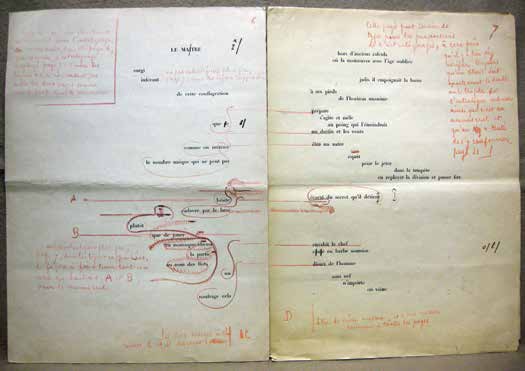UN COUP DE DÉS

1897 first proof of Un coup
1897 Ms via Monoskop; Monoskop page
HTML white on black {note: set view/character encoding to Western if accent marks do not display properly
2002 full size version (Michel Pierson)
Basil Cleveland translation (via UBU)
Christopher Mulrooney translation (via UBU)
A.S. Kline tr.
Word lists and more from Un Coup de Dés
"Toute revolution est un coup de dés," Danièle Huillet and Jean-Marie Straub (1977): assigns the words of the poem to nine different speakers, separating each from the other and using slight pauses to correspond with white spaces.
Marcel Broodthaer's version (1969): installation shot (by Ch. B.)
"Deformative" translation by Chris Edwards, "A Fluke"; French original (HTML spreads)
John Tranter's "Desmond's Coupé"
"Salut"(1893) -- in four versions; English translations
Gerald Bruns,
"Mallarmé: The Transcendence of Language and the Aesthetics of the Book" (1969)
Mallarmé's Preface
of 1897
'I would prefer that this Note was not read, or, skimmed, was
forgotten; it tells the knowledgeable reader little that is beyond
his or her penetration: but may confuse the uninitiated, prior
to their looking at the first words of the Poem, since the ensuing
words, laid out as they are, lead on to the last, with no novelty
except the spacing of the text. The 'blanks' indeed take on importance,
at first glance; the versification demands them, as a surrounding
silence, to the extent that a fragment, lyrical or of a few beats,
occupies, in its midst, a third of the space of paper: I do not
transgress the measure, only disperse it. The paper intervenes
each time as an image, of itself, ends or begins once more, accepting
a succession of others, and, since, as ever, it does nothing,
of regular sonorous lines or verse – rather prismatic subdivisions
of the Idea, the instant they appear, and as long as they last,
in some precise intellectual performance, that is in variable
positions, nearer to or further from the implicit guiding thread,
because of the verisimilitude the text imposes. The literary
value, if I am allowed to say so, of this print-less distance
which mentally separates groups of words or words themselves,
is to periodically accelerate or slow the movement, the scansion,
the sequence even, given one's simultaneous sight of the page:
the latter taken as unity, as elsewhere the Verse is or perfect
line. Imagination flowers and vanishes, swiftly, following the
flow of the writing, round the fragmentary stations of a capitalised
phrase introduced by and extended from the title. Everything
takes place, in sections, by supposition; narrative is avoided.
In addition this use of the bare thought with its retreats, prolongations,
and flights, by reason of its very design, for anyone wishing
to read it aloud, results in a score. The variation in printed
characters between the dominant motif, a secondary one and those
adjacent, marks its importance for oral utterance and the scale,
mid-way, at top or bottom of the page will show how the intonation
rises or falls. (Only certain very bold instructions of
mine, encroachments etc. forming the counterpoint to this prosody,
a work which lacks precedent, have been left in a primitive state:
not because I agree with being timid in my attempts; but because
it is not for me, save by a special pagination or volume of my
own, in a Periodical so courageous, gracious and accommodating
as it shows itself to be to real freedom, to act too contrary
to custom. I will have shown, in the Poem below, more than
a sketch, a 'state' which yet does not entirely break with tradition;
will have furthered its presentation in many ways too, without
offending anyone; sufficing to open a few eyes. This
applies to the 1897 printing specifically: translator's note.)
Today, without presuming anything about what will emerge from
this in future, nothing, or almost a new art, let us readily
accept that the tentative participates, with the unforeseen,
in the pursuit, specific and dear to our time, of free verse
and the prose poem. Their meeting takes place under an influence,
alien I know, that of Music heard in concert; one finds there
several techniques that seem to me to belong to Literature, I
reclaim them. The genre, which is becoming one, like the symphony,
little by little, alongside personal poetry, leaves intact the
older verse; for which I maintain my worship, and to which I
attribute the empire of passion and dreams, though this may be
the preferred means (as follows) of dealing with subjects of
pure and complex imagination or intellect: which there is no
remaining justification for excluding from Poetry – the
unique source.'
page edited by Charles Bernstein (updated March 2016)